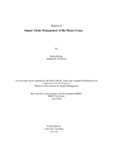| dc.contributor.advisor | Islam, Md Zikrul | |
| dc.contributor.advisor | Islam, Md Zikrul | |
| dc.contributor.author | Sultana, Abida | |
| dc.date.accessioned | 2023-01-19T08:58:21Z | |
| dc.date.available | 2023-01-19T08:58:21Z | |
| dc.date.copyright | 2022 | |
| dc.date.issued | 2022-04 | |
| dc.identifier.other | ID: 19282014 | |
| dc.identifier.uri | http://hdl.handle.net/10361/17777 | |
| dc.description | This thesis is submitted in partial fulfillment of the requirements for the degree of Masters in Procurement and Supply Management, 2022. | en_US |
| dc.description | Cataloged from PDF version of Thesis | |
| dc.description | Includes bibliographical references (page 16). | |
| dc.description.abstract | In Bangladesh, ready-made garments (RMG) represents a big opportunity, especially for
export. Readymade garments account for over 80% of total exports in our country. In addition,
the garment industry is a tremendous source of women empowerment because 80 percent of
garment workers are women. The RMG sector has been the largest foreign exchange earner in
our country's economy since the beginning of 1990. Bangladesh generated almost $20 billion
in revenue from garment exports in 2013-14, with RMG accounting for 75% of total exports
and the majority of the currency of the country. The Ha-Meem Group, a leading garment
factory, is fast expanding in order to reach $1 billion in export income. After covid, they have
become the highest exporter of Bangladesh.
Gap, Esprit, American Eagle Outfitters, H&M, Abercrombie & Fitch, Kohl's, Tommy
Hilfiger, JC Penney, Mango, Zara, Next, Tom Tailor, and Oshkosh are among the major
purchasers of Ha-Meem Group's $535 million yearly exports. The company already produces
3 million yards of denim fabric per month, and the two additional facilities will increase that to
6 million yards. Ha-Meem has decided to increase their denim manufacturing in response to
increased global demand for the fabric. The company currently employs 50,000 people across
its numerous divisions and is trying to increase its workforce.
Ha-Meem Group has established itself as one of Bangladesh's leading garment enterprises,
both at home and internationally. The ongoing growth of this organization goes hand in hand
with the industrialization of its own nation, Bangladesh. They also made a significant
contribution to the country's economic development.
I started working with Ha-Meem group on October 2021, in the PSM Department. I have
tried my best to write this report with my job responsibilities and the working conditions with
many activities. Lastly, this report is quite beneficial because it gives a thorough overview of
the Ha-Meem group's supply chain management. This department has its own set of problems,
and I've done my best to come up with a solution that addresses them. | en_US |
| dc.description.statementofresponsibility | Abida Sultana | |
| dc.format.extent | 16 Pages | |
| dc.language.iso | en_US | en_US |
| dc.publisher | Brac University | en_US |
| dc.rights | Brac University Theses are protected by copyright. They may be viewed from this source for any purpose, but reproduction or distribution in any format is prohibited without written permission. | |
| dc.subject | Supply Chain Management | en_US |
| dc.subject | Ready-Made Garments (RMG) | en_US |
| dc.subject.lcsh | Industrial procurement -- Management. | |
| dc.title | Supply Chain Management of Ha-Meem Group | en_US |
| dc.type | Thesis | en_US |
| dc.contributor.department | Brac Institute of Governance and Development, Brac University | |
| dc.description.degree | M. Procurement and Supply Management | |

